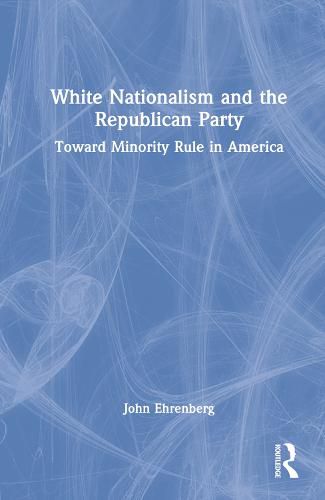Readings Newsletter
Become a Readings Member to make your shopping experience even easier.
Sign in or sign up for free!
You’re not far away from qualifying for FREE standard shipping within Australia
You’ve qualified for FREE standard shipping within Australia
The cart is loading…






In this book, John Ehrenberg argues that Donald Trump, as both candidate and president, represents a qualitatively new stage in the evolution of the Republican Party’s willingness to exploit American racial tensions.
Works on Trump’s use of race have tended to be fragmentary or subsidiary to a larger purpose. Ehrenberg concentrates his investigation on Trump’s weaponized use of race, contextualized through historical and theoretical details, demonstrating that while Trump draws on previous Republican strategies, he stands apart through his explicit intention to convert the Republican Party into a political instrument of a threatened racial order. The book traces the Grand Old Party’s (GOP) approach to racial matters from Goldwater’s constitutional objection to federal activity in the South to George W. Bush’s overtures to Black citizens. Ehrenberg examines the role of racial animus in prying loose a significant portion of the Democratic Party’s electoral coalition and making possible Trump’s overt flirtation with white nationalism. He concludes that the Republican Party will find it difficult to jettison its 50-year history of embracing and amplifying white racial animus and resentment.
White Nationalism and the Republican Party will be of interest to academics and students of American politics, voting behavior, American party politics, race and American politics, twentieth-century American history, political leadership, politics of inequality, race and public policy.
$9.00 standard shipping within Australia
FREE standard shipping within Australia for orders over $100.00
Express & International shipping calculated at checkout
In this book, John Ehrenberg argues that Donald Trump, as both candidate and president, represents a qualitatively new stage in the evolution of the Republican Party’s willingness to exploit American racial tensions.
Works on Trump’s use of race have tended to be fragmentary or subsidiary to a larger purpose. Ehrenberg concentrates his investigation on Trump’s weaponized use of race, contextualized through historical and theoretical details, demonstrating that while Trump draws on previous Republican strategies, he stands apart through his explicit intention to convert the Republican Party into a political instrument of a threatened racial order. The book traces the Grand Old Party’s (GOP) approach to racial matters from Goldwater’s constitutional objection to federal activity in the South to George W. Bush’s overtures to Black citizens. Ehrenberg examines the role of racial animus in prying loose a significant portion of the Democratic Party’s electoral coalition and making possible Trump’s overt flirtation with white nationalism. He concludes that the Republican Party will find it difficult to jettison its 50-year history of embracing and amplifying white racial animus and resentment.
White Nationalism and the Republican Party will be of interest to academics and students of American politics, voting behavior, American party politics, race and American politics, twentieth-century American history, political leadership, politics of inequality, race and public policy.